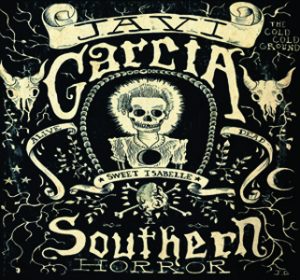There’s a young man coming round, and he’s armed for bear …
By Don Henry Ford
(LSM Aug/Sept 2010/vol. 3 – Issue 5)
The first time I got my hands on Javi Garcia’s A Southern Horror, I was a bit put off to remove the disc and find a red-faced caricature of the devil grinning up at me. I’m no fan of that bastard. Matter of fact, I detest everything he stands for. But it didn’t take more than a few seconds of listening for the first song to grab my attention. An interesting voice and well-played music snapped my head to full alert; hard hitting lyrics, truth, anger, passion — all the stuff that separates real songs from the rest — kept me listening to the end. By the third pass, I was singing along with the record.
The sound is more rock than country, but decidedly Texan and Americana in theme. I hear shades of Ryan Bingham and a young Steve Earle before they got bought, but perhaps even more pissed off than either of those guys ever was. That’s OK with me: if you ain’t pissed off, you ain’t paying attention. There’s a song that could be by the Rolling Stones. Echoes of Chris Knight on another, and still another that sounds like bluegrass. Javi Garcia is no one trick pony.
As for the devil, well … there’s entirely too much truth in Javi’s work for all of his inspiration to originate from the dark side. And sure enough, when I meet the artist, it doesn’t take long for me to see that Javi is a long way from some sort of devil worshiper.
He arrives in a small economy car. He’s barrel-chested and light skinned, and tattoos cover his hands, arms and the part of his chest that his shirt doesn’t hide. He has a mop of unruly dark hair and intelligent brown eyes, and quickly proves to be polite, well-mannered and entirely pleasant company. He is not the hoodlum or the killer or the dope head that appears in his songs.
Javi is 29 years old. Living with a girlfriend that’s pregnant with his first child. He was raised near the Rio Grande River in Weslaco, Texas — a town he describes as a hard place, where people don’t give a shit about anything, including themselves: a place brimming with citrus, drugs, hate and sweltering heat.
He’s the product of a broken marriage. His dad is a cop and has been married a number of times. Javi didn’t know his paternal grandfather growing up, but when he finally did meet the man, he learned that he, too, had been a musician. When his granddad found out Javi was also a musician, he suggested that he should quit.
Javi describes more than a normal share of his mother’s side of the family as criminals, murderers, drunks and other types too bad to be discussed even in Weslaco. He never knew his maternal grandfather, but knows that he played the accordion. A step-grandfather Javi did know was murdered shortly after his parents divorced. The man was machine-gunned to death in Rio Grande City, his body then burned in his own van. The killers were never found.
At some point in Javi’s young life, he found himself homeless, sleeping on borrowed couches, working in a bar, saving money so he could get out of town. The day came when he sold all his possessions and headed for San Antonio. He arrived with no car, no guitar, just a bag of clothes and a dream. He took a job answering phones and got fired for being rude to some lady.
 San Antonio seemed too much like Weslaco for Javi, so he struck out for New Braunfels, hoping to make it in the music business. Getting gigs proved difficult, but he persisted. He wrote songs, played where he could and saved money to make a record. Roel Piña, an uncle, kicked in additional money, and Javi bought five days of studio time. The resulting album was recorded live with minimal post-production work. He produced the album himself because he didn’t want to compromise his vision and couldn’t afford to pay someone else to produce the record anyway. Not many of the songs will be suitable for radio play due to cuss words. But with A Southern Horror (which is packaged with a slightly earlier EP, Madly in Anger), Javi has written, played, sung and produced exactly the record he wanted to make. Some will love it, others will hate it, and few will fall between those extremes. Any that dare listen will be moved. For the record, I fall firmly into the love-it camp. I think his is a voice that needs to be heard, and A Southern Horror has already made my best-of-the-year list.
San Antonio seemed too much like Weslaco for Javi, so he struck out for New Braunfels, hoping to make it in the music business. Getting gigs proved difficult, but he persisted. He wrote songs, played where he could and saved money to make a record. Roel Piña, an uncle, kicked in additional money, and Javi bought five days of studio time. The resulting album was recorded live with minimal post-production work. He produced the album himself because he didn’t want to compromise his vision and couldn’t afford to pay someone else to produce the record anyway. Not many of the songs will be suitable for radio play due to cuss words. But with A Southern Horror (which is packaged with a slightly earlier EP, Madly in Anger), Javi has written, played, sung and produced exactly the record he wanted to make. Some will love it, others will hate it, and few will fall between those extremes. Any that dare listen will be moved. For the record, I fall firmly into the love-it camp. I think his is a voice that needs to be heard, and A Southern Horror has already made my best-of-the-year list.
What he captured on tape is a journey through and from the borderlands. It’s a region whose residents are ignored and marginalized by the countries both to the north and the south — and a place where having a real job is the exception to the rule, particularly for those of younger generations. A rather large percentage of the residents in the area are Hispanic. For most, being a citizen of the United States isn’t a matter of having crossed the border; conversely, it’s a matter of the border having crossed them. The area in which they live was once Mexico, as was all of Texas. But even after Texas won its independence and on into the years when Texas joined the Union, the Southern border was in dispute and some residents still considered it Mexican territory. It wasn’t until a subsequent war between Mexico and the United States that the Rio Bravo, or as we call it, the Rio Grande, was accepted by both sides of the dispute as the official border. Unfortunately for landowners in the area, though, most land titles were not recognized by the United States. While descendants of these people now realize the land will never be recovered, there are those that to this day contest ownership. I’ve seen the maps and the useless titles plastered on the walls of their homes. The land was stolen; underlying resentment and hostilities remain. To add insult to injury, oil was found under that land, enriching the new owners and leaving the previous owners mired in poverty.
Not surprisingly, the pictures Javi paints of the aftermath of all of this aren’t pretty — in fact, I’d call them dark as hell. He sings most of his songs in the first person, though some are obviously borrowed from the lives of others. He opens with a young man telling his mother he’ll kill her piece of shit abusive husband. Before the song is over, the blood of her abuser mixes with the water of the Comal County River. Then we learn that same blood flows through the protagonist’s veins; the abuser is his dad. The songs get darker. In “God and Country,” a vet recalls going to war in a futile attempt to feed his family after the jobs in Cameron County went away in this goddamned thing they call a global economy; he now lies near a bed pan lamenting the days before he enlisted and left his legs buried in desert sand. Later, Javi places himself into the blue garb of a cop, one bloodstained hand tilting the scales of justice, the other bearing the weight of a loaded gun. Anger and the pain of failed relationships rip and tear through other songs; misguided forays into booze and drugs rear sneering heads as Javi strains for relief but finds none. The anger of rejection Javi has encountered is laced throughout the work. The music business is tough for a good ol’ white boy, tougher yet for those of Mexican extraction.
But if you think Javi is just another hard-driven rocker with a bad attitude, he has a surprise in store. He’s already writing his next album and says it will be bluegrass. If the bluegrass tune on A Southern Horror, “Wicked as You,” is any indication, I think he can pull it off.
Javi has had a rough go so far. The end of his story remains unwritten. I’m reminded of Steve Earle’s “Unrepentant,” in which a young man picks up his weapon and hits the road, headed toward a collision with the devil. Only in Javi’s case, his weapon is a guitar and a handful of true words. The gauntlet awaits. Fire, blood, brimstone. Anger, fear, prejudice, hatred of the truth. Curses will fly. Bodies will fall. His will be no fairy tale where everyone walks away and lives happily ever after. But it’ll be undeniably real. True southern horror, you might say.
Buena suerte, Javier Garcia Jr. May God have mercy on us.







No Comment